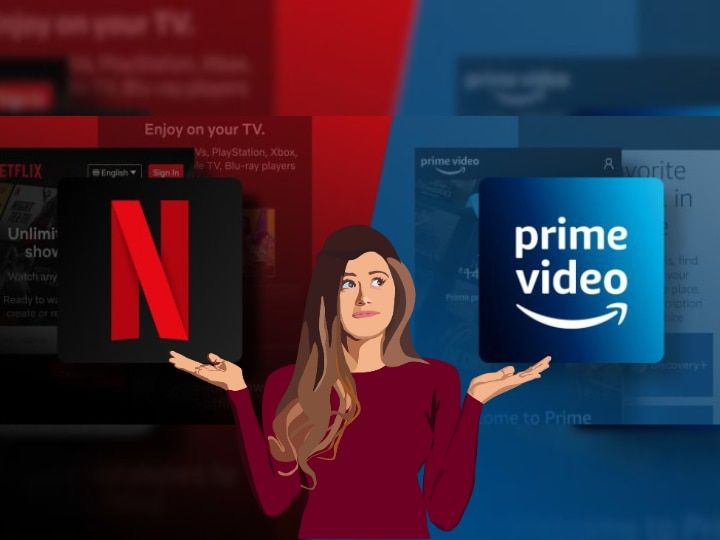Netflix Faces Backlash and Industry Ridicule for Password Sharing Crackdown: The Battle for Streaming Dominance Intensifies.
Netflix, one of the leading streaming giants, finds itself at the center of a heated controversy after implementing measures to crack down on password sharing. The move has not only drawn criticism from its subscribers but has also become a subject of mockery from its competitors. Amazon Prime Video, in a playful jab, took to Twitter with a cleverly crafted image mocking the crackdown. This article explores the real news behind Netflix’s decision, the ensuing industry backlash, and the ongoing battle for dominance in the streaming market.
The Controversial Password Sharing Crackdown:
In an effort to address unauthorized password sharing, Netflix recently introduced stricter measures, sparking outrage among some of its users. The company has long been aware of the widespread practice of sharing accounts, allowing individuals to access its extensive library without subscribing themselves. Seeking to protect its revenue and intellectual property, Netflix decided to take action.
The new measures aim to detect and limit the number of devices accessing an account simultaneously. Users who exceed the permitted number of simultaneous streams are prompted to upgrade their subscription or sign up for a separate account. While this move is intended to curb unauthorized password sharing and ensure fair use of the service, it has ignited a backlash among subscribers who feel their freedom and convenience are being compromised.
Rival Mockery on Social Media:
Following Netflix’s announcement, its competitors wasted no time in seizing the opportunity to take a dig at the streaming giant. Amazon Prime Video’s Twitter account tweeted a cleverly designed image, with user profiles spelling out the message, “Who’s watching? Everyone who has our password.” This playful jab at Netflix’s crackdown struck a chord with users and triggered further discussions on the topic.
The move by Amazon Prime Video exemplifies the fierce competition and rivalry that exists in the streaming industry. As streaming services vie for subscribers and market dominance, they often employ various tactics to differentiate themselves and gain an edge over their competitors. Mockery and public jabs on social media have become common occurrences in this ongoing battle for supremacy.
The Battle for Streaming Dominance:
The streaming industry has experienced exponential growth in recent years, with numerous platforms competing for subscribers’ attention. Netflix, as a pioneer in the field, enjoyed a significant head start and became synonymous with streaming entertainment. However, the rise of new contenders, such as Amazon Prime Video, Disney+, Hulu, and HBO Max, has intensified the competition for viewership and market share.
Each streaming service strives to attract and retain subscribers by offering a vast content library, original programming, and user-friendly features. However, the issue of password sharing has posed a challenge for these platforms, as it dilutes their potential revenue and makes it difficult to accurately measure viewership metrics.
The Case for Protecting Revenue and Intellectual Property:
While critics argue that password sharing is a common and accepted practice that fosters inclusivity, convenience, and a sense of community among users, streaming services face legitimate concerns regarding their revenue and intellectual property. The costs associated with producing and licensing high-quality content are substantial, and unauthorized account sharing undermines their ability to generate revenue and invest in future programming.
By cracking down on password sharing, Netflix and other streaming services aim to protect their business interests and ensure a fair and sustainable streaming model. This decision is driven by the need to balance user convenience with the financial viability of these platforms.
Subscriber Backlash and User Experience:
Netflix’s crackdown on password sharing has not been without consequences, as it has faced significant backlash from its subscribers. Many users argue that password sharing allows them to access a wide range of content at an affordable cost, fostering a sense of value and loyalty towards the platform. The decision to restrict simultaneous streams is seen by some as a hindrance to user convenience and may prompt some users to consider alternative streaming services that offer more flexibility.
Furthermore, critics argue that Netflix’s approach to password sharing could alienate its user base and damage its reputation. The streaming service has built a strong following by providing a user-friendly experience and prioritizing customer satisfaction. Implementing strict measures to combat password sharing may be perceived as a departure from the customer-centric approach that has been a hallmark of Netflix’s success.
Finding a Middle Ground:
As the streaming industry continues to evolve, striking a balance between protecting revenue and maintaining a positive user experience becomes increasingly challenging. While cracking down on password sharing is a logical step for streaming services to safeguard their business interests, it is essential to consider the potential impact on subscribers and the overall perception of the platform.
Some streaming services have taken a different approach to address password sharing concerns. Rather than outright crackdowns, they have introduced features that allow users to create multiple user profiles within a single account, effectively accommodating shared access while still ensuring accurate viewership metrics. This approach acknowledges the changing dynamics of modern households and the desire for personalized viewing experiences.
The Future of Password Sharing and Streaming:
The issue of password sharing in the streaming industry is a complex one, with no easy solution. While some viewers engage in unauthorized account sharing without malicious intent, it remains a challenge for streaming platforms to strike the right balance between user convenience and protecting their revenue streams.
As the battle for streaming dominance continues, it is likely that streaming services will explore innovative strategies to address password sharing more effectively. This may involve the development of advanced authentication methods, personalized pricing models, or partnerships with other platforms to offer bundled services.
It is important for streaming services to listen to their subscribers and consider their feedback when devising strategies to combat password sharing. By understanding user needs and expectations, platforms can find innovative ways to adapt and evolve while maintaining a strong value proposition.:
Netflix’s decision to crack down on password sharing has ignited a heated debate within the streaming industry. While the move is aimed at protecting the company’s revenue and intellectual property, it has faced significant backlash from subscribers who see password sharing as a convenient and communal practice.
The playful mockery by Amazon Prime Video on social media further highlights the intense competition among streaming services and their willingness to capitalize on each other’s controversies. The battle for streaming dominance is not only about content and user experience but also about revenue protection and market share.
As the streaming landscape continues to evolve, finding a middle ground between safeguarding business interests and meeting customer expectations will be essential. Striking the right balance may require innovative approaches that accommodate shared access while still ensuring accurate metrics and revenue generation.
Ultimately, the future of password sharing and streaming will depend on the ability of streaming services to adapt and find solutions that satisfy both their business needs and the expectations of their subscribers. The ongoing battle for dominance in the streaming market will undoubtedly shape the industry’s trajectory and redefine the way we consume entertainment in the digital age.



No Comments
Leave Comment